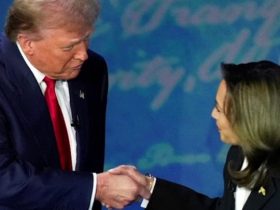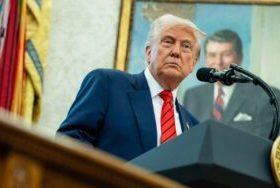President Donald Trump on Monday said the situation with Iran is entering ‘dangerous territory’ as he announced his administration would be talking to Iran on Saturday.
While it’s not yet known what the talks will achieve, experts continue to warn that time is running out to not only block Iran’s nuclear program but to utilize existing tools to counter Tehran’s dismissal of international law, a mechanism known as ‘snapback’ sanctions.
‘This is the one time that we have the ability to sort of put new sanctions on Iran where we don’t need Russia and China’s help, and we can just do it unilaterally,’ Gabriel Noronha of the Jewish Institute for National Security of America told Fox News Digital. Noronha is an Iran expert and former special advisor for the Iran Action Group at the State Department.
The ability to employ snapback sanctions on Iran expires Oct. 18, 2025, which coincides with when Russia will lead the United Nations Security Council (UNSC) presidency for its rotational one-month stint.
The provision for snapback sanctions was enacted under UNSC Resolution 2231, which was agreed to just days after the Joint Comprehensive Plan of Action (JCPOA) was signed in 2015 as a way to ensure that if Iran was found to be violating the nuclear deal, stiff international sanctions could once again be reimposed.
The JCPOA has increasingly been considered a collapsed agreement after the U.S. withdrew in 2018 under the first Trump administration, followed by increasingly flagrant violations by Iran of the nuclear deal.
This has culminated in the rapid expansion of Tehran’s nuclear program and the assessment by the U.N. nuclear watchdog earlier this year that Tehran had amassed enough near-weapons-grade uranium to develop five nuclear weapons if it were to be further enriched.
European nations for years have refused to enact snapback sanctions in a move to try and encourage Tehran to come back to the negotiating table and diplomatically find a solution to end its nuclear program.
Any participant in the JCPOA can unilaterally call up snapback sanctions if Iran is found to have violated the terms of the agreement. But the U.S., which has been calling for snapbacks since 2018, was found by the U.N. and all JCPOA members to no longer be legally eligible to utilize the sanction mechanism after its withdrawal from the international agreement.
But as Iran continues to develop its nuclear program, the tone among European leaders has also become increasingly frustrated.
France’s foreign minister last week suggested that if Iran did not agree to a nuclear deal and halt its program, then military intervention appeared ‘almost inevitable.’
‘Iran must never acquire nuclear weapons,’ Foreign Minister Jean-Noel Barrot reportedly told France’s Parliament on Wednesday.
‘Our priority is to reach an agreement that verifiably and durably constrains the Iranian nuclear program,’ he added.
It remains unclear how much longer European nations will attempt to hold out for discussions with Iran, as Trump has said he is becoming fed up with Tehran and has threatened direct military confrontation, even while he has made clear his administration’s willingness to discuss a deal with Tehran.
With France serving as UNSC president in April and the bureaucratic red tape Russia could employ, UNSC members supportive of blocking Iran’s nuclear program must immediately call up snapback sanctions, Noronha said.
‘It takes about six weeks to actually be implemented properly,’ said Noronha, author of ‘Iran Sanctions, U.N. Security Council Resolution 2231, and the Path to Snapback,’ which was released last week. ‘And second, because the distribution of the presidencies and leadership of the U.N. Security Council is weighted towards more favorable leaders right now in the spring before it goes to pretty adversarial leadership in the summer and fall.’
The expert said this is a rare moment for the UNSC, which in recent years has become increasingly ineffective in accomplishing major geopolitical wins because it is generally divided between the U.S., U.K. and France on one side and Russia and China on the other.
A single veto is enough to block a resolution being enacted, and progress in the council has become stagnant following Russia’s invasion of Ukraine.
But even if Russia objects to reimposing sanctions on Iran, as Tehran has become a close ally of Moscow’s, it actually has very few options for blocking the snapback mechanism that it previously agreed to, so long as at least one other nation actually calls for the sanction tool.
‘This is the only time this has ever happened at the U.N. before,’ Noronha said. ‘They basically said, when we invoke snapback, what it does is it says U.N. sanctions will automatically return unless there’s a vote by the council to unanimously allow sanctions relief to remain on the books.’
The snapback mechanism would legally enforce all 15 UNSC member nations to reimpose sanctions on Iran, including Russia and any nation that may be sympathetic to Tehran.
If the snapback mechanism expires come October, the U.N.’s hands will likely be tied when it comes to countering Iran’s nuclear program, as it is unlikely any new resolutions on the issue will be able to pass through the council given the current geopolitical climate between the West and Russia.







